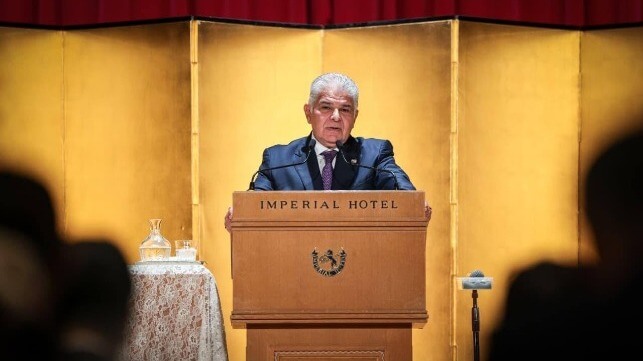President Mulino & Japanese Shipowners Meet to Improve Panama Ship Registry

[By: Panama Maritime Authority]
President José Raúl Mulino met with more than 40 representatives of shipping companies from Japan’s Kanto region, where he presented Panama’s new ship registry strategy aimed at safeguarding its global leadership through enhanced safety standards and fully digitalized processes.
Mulino emphasized that Panama’s registry is positioning itself as the flag of the future, driven by new policies aligned with international benchmarks for safety, efficiency, and environmental protection.
The stakes are high for Japan: 7 out of 10 Japanese shipowners already fly the Panamanian flag, and 41% of Japan’s total tonnage is registered under Panama. For Panama, consolidating its role as Japan’s preferred registry is vital, as 66% of new shipbuilding comes from the Japanese market.
Reflecting on the registry’s long history dating back to the 1920s, Mulino stressed that unlike other registries, Panama’s flag is not a maritime franchise but a national emblem backed by the full weight of the state. He also revealed that his administration is pushing forward a comprehensive modernization plan for the registry, framed within a broader maritime and logistics strategy that integrates the Canal and Panama’s port system. “This plan will bring together our entire maritime cluster under what we now call the National Maritime Strategy—the future of our country,” Mulino declared, pledging to see this project through during his presidency. He underscored his vision of a more flexible Maritime Authority and registry that provides streamlined, user-friendly services. “You can count on Panama’s registry to continue working in favor of the global maritime community, especially Japan,” Mulino told the gathered shipowners.
Joining him were Panama Maritime Authority (PMA) Administrator Luis Roquebert and Merchant Marine Director Ramón Franco, both of whom reinforced the president’s message.
“Panama has been the world’s natural bridge since ancient times. The creation of our Ship Registry in the early 20th century, alongside the construction of the Canal, positioned the Isthmus as a global benchmark in ship registration—changing the course of maritime history,” Roquebert noted.
He highlighted that the PMA has successfully diversified its services, now offering integrated solutions in over 50 countries. “Thanks to our broad network of partners and our expertise, we provide unmatched technical, legal, and diplomatic support,” Roquebert said.
For his part, Merchant Marine Director Ramon Franco presented “The Panamanian Ship Registry: Renewing Our Strategy for a New Era,” outlining Panama’s new direction and the competitive advantages it offers.
He explained that the Mulino administration’s guiding principle is quality over quantity,
focusing on:
- A safer fleet and significant accident reduction.
- 100% digital, streamlined processes.
- A younger fleet, with active policies to phase out high-risk vessels.
- Rigorous inspections and enhanced pre-checks to ensure only compliant ships fly Panama’s flag.
- Trust from industry leaders—Japanese shipowners choose Panama because its security and reputation protect both investments and cargo.
Franco also underlined Panama’s pioneering role as the first registry to enforce mandatory traceability for ship-to-ship (STS) transfers, part of a strategy to modernize the fleet by gradually phasing out older tonnage and aligning with the IMO’s decarbonization goals for 2050.
As of August 25, 2025, Panama’s ship registry includes 8,812 vessels totaling 241.5 million gross tons (GT), according to IHS Markit—representing 14% of the global fleet, based on Clarksons Research’s World Fleet Monitor.
Franco reported that the new strategy is already delivering results: fewer accidents and a 13% increase in newbuilding registrations compared to the previous year. He closed by reminding Japanese shipowners that Panama’s registry offers more than just a flag—it comes with the full backing of a country that provides political and economic stability, a robust banking system, special economic zones, investment incentives, world-class logistics hubs, and, of course, the Panama Canal.
The products and services herein described in this press release are not endorsed by The Maritime Executive.

